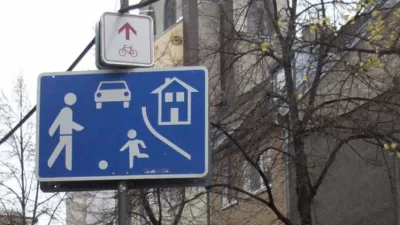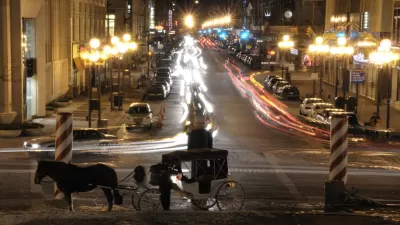Complete Streets
Federal Complete Streets Mandate Gains Speed
Although nearly 500 localities around the U.S. have created complete streets policies, there is no federal mandate that they do so. That may soon change if a bipartisan bill introduced last week in the House of Representatives is passed.
Could a Petition Sway the U.S. DOT to Change Its Ancient Road Classification System?
US Department of Transportation (DOT) officials would consider a change in the way they classify thoroughfares — to the benefit of pedestrians, bicyclists, and transit users — but they need political support, writes Robert Steuteville.
Ways to Fail at Form-Based Codes 04: Don’t Capture the Character
Form-based codes extract the DNA of the desired local character, and enable it by right. Hazel Borys talks about how to get the numbers right in this week's Back of the Envelope.

The Voyage of the Woonerf
Writing in The New York Times, Paul Hockenos describes the revival and global spread of the "woonerf", the Dutch complete street model that's bringing shared public space to cities from Montreal to Auckland.
10 Principles for Smart Growth in Existing Communities
Frustrated by what's passing as "smart growth" and "transit oriented development," Bill Adams postulates ten refinements (or less subtly stated clarifications) of the principles of smart growth and new urbanism.

For a Model Complete Streets Policy, Look to Indianapolis
Smart Growth America has recognized the best of the 130 complete streets policies approved last year across the United States; and the one passed by Indianapolis has received the highest ranking.
Cycle Tracks and Bus Only Lanes Coming to Downtown L.A.
The updated designs for an ambitious project to remake car-clogged Figueroa Street as a transit-, pedestrian-, and bicycle-friendly complete street have been made public in advance of a community meeting next month.
6 Easy Ways to Make a City More Livable
Baltimore has a lot of bold ideas for changing the face of the city. While we wait for them to happen, why not implement some simple solutions for making the city more livable, proposes Mark R. Brown, AICP.
Placemaking Wishes for 2013
Like a lot of people, Placeshakers is kicking off the new year with a list: placemaking wishes for 2013. Read on for seven trending ideas they hope break large.
Raleigh Paves the Way for Walkability
Raleigh, North Carolina didn't take getting placed sixth most dangerous metro area in the country lightly back in 2009, and recently drafted a Comprehensive Pedestrian Plan in response.
Transit Wins at Job Creation Game
Blogging on HuffPo, Greg LeRoy, director of Good Jobs First, makes the case that transit, transit oriented development and smart growth are key factors in job growth.
Complete Streets Gaining Speed
A new report details the growing adoption of Complete Streets policies in locales across the United States, despite the removal of a Complete Streets provision from the recent federal transportation bill.
What's the Difference Between a Strip Mall and Paris?
Geoff Dyer points out why the difference between the typical strip mall and the multi-way boulevard may be more subtle than you think.
Pop-up Infrastructure Makes a Street Green and Complete
Imagine converting a downtown street into a bicycle, people, and eco-friendly one - for just one week, by a crack team of urban design graduate students. Such an undertaking was done by Kent State U.'s urban design collaborative. Watch and learn!
What's to Come of America's Pedestrian Malls?
In a pictorial essay, Mark Byrnes chronicles the uneven legacy of 50 years of pedestrian malls, and the uncertain future for a redevelopment tool that has been derided in some cities and celebrated in others.
Ambitious Complete Street Project for LA Back On Track
James Brasuell celebrates the perseverance of one of LA's "most important urban projects," the remaking of Figueroa Boulevard, one of the city's major spines, linking downtown to the campus of the University of Southern California.
Planning to Walk
In the final installment of his series on "Walking in America" on Slate, Tom Vanderbilt looks at why so much of the built environment is hostile to pedestrians, and how planning can change that.
Using the Wrong Metrics for Creating Great Streets
Gary Toth considers the damage to the quality of our streets and urban environments caused by the use of travel projection models and Levels of Service (LOS) as performance metrics.
Retrofitting Long Island Suburbs For The Pedestrian
Complete streets, road diets, streetscape improvements - geared to promote suburban downtowns for new residents who seek access to amenities without having to drive is a hit for some towns who have successfully obtained government grants to fund them
Pagination
Urban Design for Planners 1: Software Tools
This six-course series explores essential urban design concepts using open source software and equips planners with the tools they need to participate fully in the urban design process.
Planning for Universal Design
Learn the tools for implementing Universal Design in planning regulations.
Clanton & Associates, Inc.
Jessamine County Fiscal Court
Institute for Housing and Urban Development Studies (IHS)
City of Grandview
Harvard GSD Executive Education
Toledo-Lucas County Plan Commissions
Salt Lake City
NYU Wagner Graduate School of Public Service


































